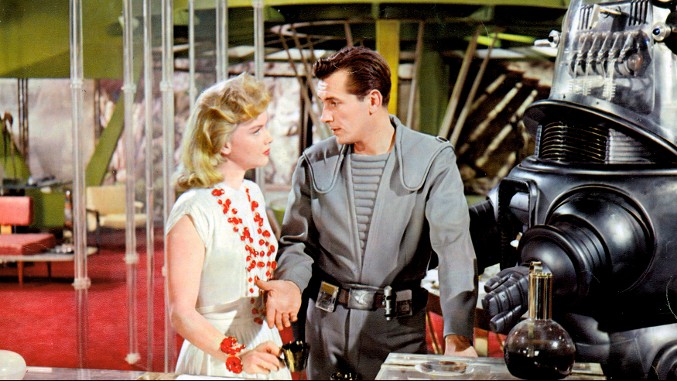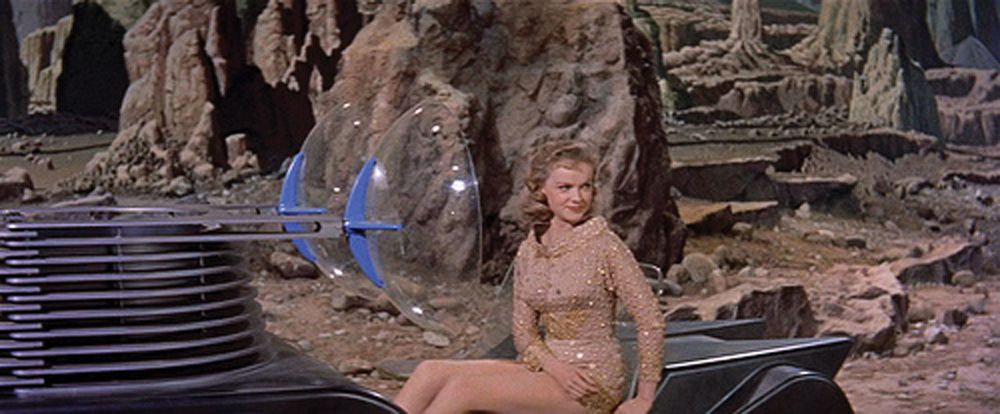Love of science fiction was a generational attachment in the house I grew up in. My father was a child of the early 1950s, and I watched The Day The Earth Stood Still, THEM!, Invasion of the Body Snatchers, Star Trek, and The Outer Limits long before I saw Star Wars or Indiana Jones. I was busy chattering away about Klaatu and Gort while my friends were discussing how badass Will Smith was in Independence Day.
Perhaps, like my father before me, I grew to view these films with a touch of nostalgia, even as decades passed since I saw them last. In those intervening years, much changed, both in my personal life as well as on a larger global scale. When my father suggested off-handedly that we sit down and watch Forbidden Planet – since my husband had never seen it before – my only hesitation was that the pacing of an older movie might bore him to tears. But, ever a good sport, my husband and I trekked out to my parents’ house, made some popcorn, and sat down to watch Forbidden Planet.

Aside: For those of you unfamiliar with Forbidden Planet, the 1956 film stars Leslie Nielsen, Anne Francis, and Walter Pidgeon. A science fiction interpretation of Shakespeare’s The Tempest, it gave us several cultural icons: the famous alien species the Krell, “Robby the Robot” and the phrase “monsters of the id.”
The feel-good wave of nostalgia I felt while viewing the opening credits was quickly replaced by horror, and the sudden realization that this film was not what I remembered it to be. From the first moments of the film, the all-white, all-male starship crew made crude statements.
Their lament about the planet they were visiting set the mood: “No beer, no women, no pool parlors, nothing!” and the crew’s astonishment about Robby the Robot’s synthesizing abilities – “why, it’s a housewife’s dream!” confirmed that it was as they say, a product of its time.
The headache increased as the movie continued. Altaira (Francis), the daughter of the sole survivor of the spacecraft Bellerophon, is a pretty, straight 20-something who has never seen another man before other than her father, Dr. Morbius (Pidgeon), who neglected to teach her anything about relationships and intimacy, sexual or otherwise.
What follows is a solid segment of the movie where the second in command of the ship takes sexual advantage of her naivete, and then the ship’s Commander (Nielsen) proceeds to shame her.
“Well, I don’t feel free to discuss the shortcomings of a fellow officer, but any girl or woman who lets him get her alone, anywhere…”
Commander: “Don’t you understand, Alta? No? Well, look at yourself. You can’t dress like that around men, especially not a space wolf like Farman. So for Pete’s sake, go home and put on something that’ll….anything?”
Altaira: “What’s wrong with my clothes? I designed them myself…Stop looking at me that way, I don’t think I like it.”
Commander: “It just so happens that I’m in command of competitively selected super-perfect physical specimens…who have been locked up in hyperspace for days! It would have served you right if I hadn’t have…and he…!”
After that encounter, Altaira asks Robby the Robot to fabricate her a new dress, saying “absolutely nothing must show, below, above, or through,” before additionally stipulating that is must be “eye-proof.” That line – that it must be eye-proof – really hit me. For all I was thinking up to that point that this film was a product of the 1950s, that line seemed very modern to me.
How many times have I zipped my jacket up over my face and pulled my hat down lower while walking around in public because I didn’t want people to see me, because that invited unwanted opportunity by strangers to harass me?
I have this very vivid memory from last summer, at PaizoCon – it was warm in the main hall where the tables were set up to play, so I was wearing shorts. During a lunch break, I wanted to go across the street – a busy, 4×4 lane state highway with a stoplight – to a convenience store to get some snacks.
The thought of standing at that intersection, in shorts, sent a wave of uneasiness through me, and I quickly ran upstairs to change into pants before venturing outside. Altaira’s line resonated in my head: “stop looking at me that way, I don’t like it.”
I won’t give the rest of the film away, as the science fiction story within it is quite good, and the twist at the end is a classic for a well-deserved reason. After finishing the film, I think my greatest frustration lies not within the lines of dialogue or racial/gender diversity of the crew (which, I’m still frustrated with), but with how much of that sexism, slut-shaming, and avoidance behavior that was apparent in 1956 is still alive and well in 2019. Society as a whole can still blame victims for “inviting” unwanted attention by how they dress, instead of looking at the perpetrators. The idea that perpetrators of violence aren’t really in control of their actions by are instead “provoked” by how scantily their victims are clad.

I’m glad that newer science fiction television series and films have been making efforts to be more diverse in terms of gender, race, and sexuality. But we still have a long way to go, both in films and television, but in society as well. I’m disappointed with Forbidden Planet, and I don’t think I’ll be watching it again. However, I’d be intrigued by the idea of a remake/update, hopefully with a more diverse crew and updated interpersonal storyline.
What other films do you have nostalgic, warm feelings for, but you think wouldn’t stand up to the scrutiny of a rewatch without youth and naivety rose-colored glasses?

